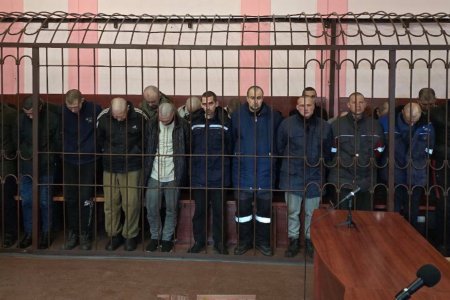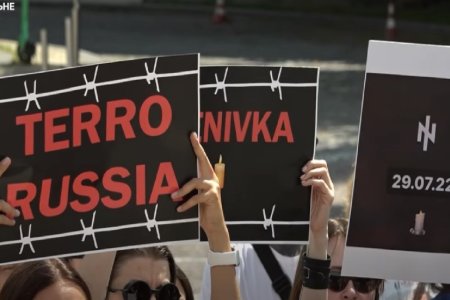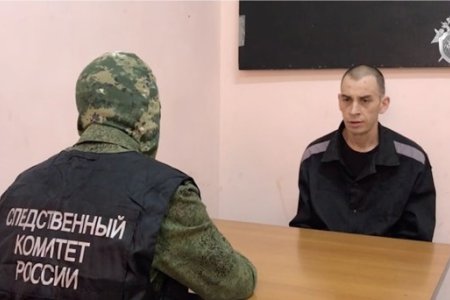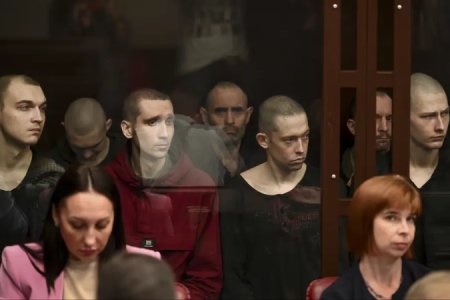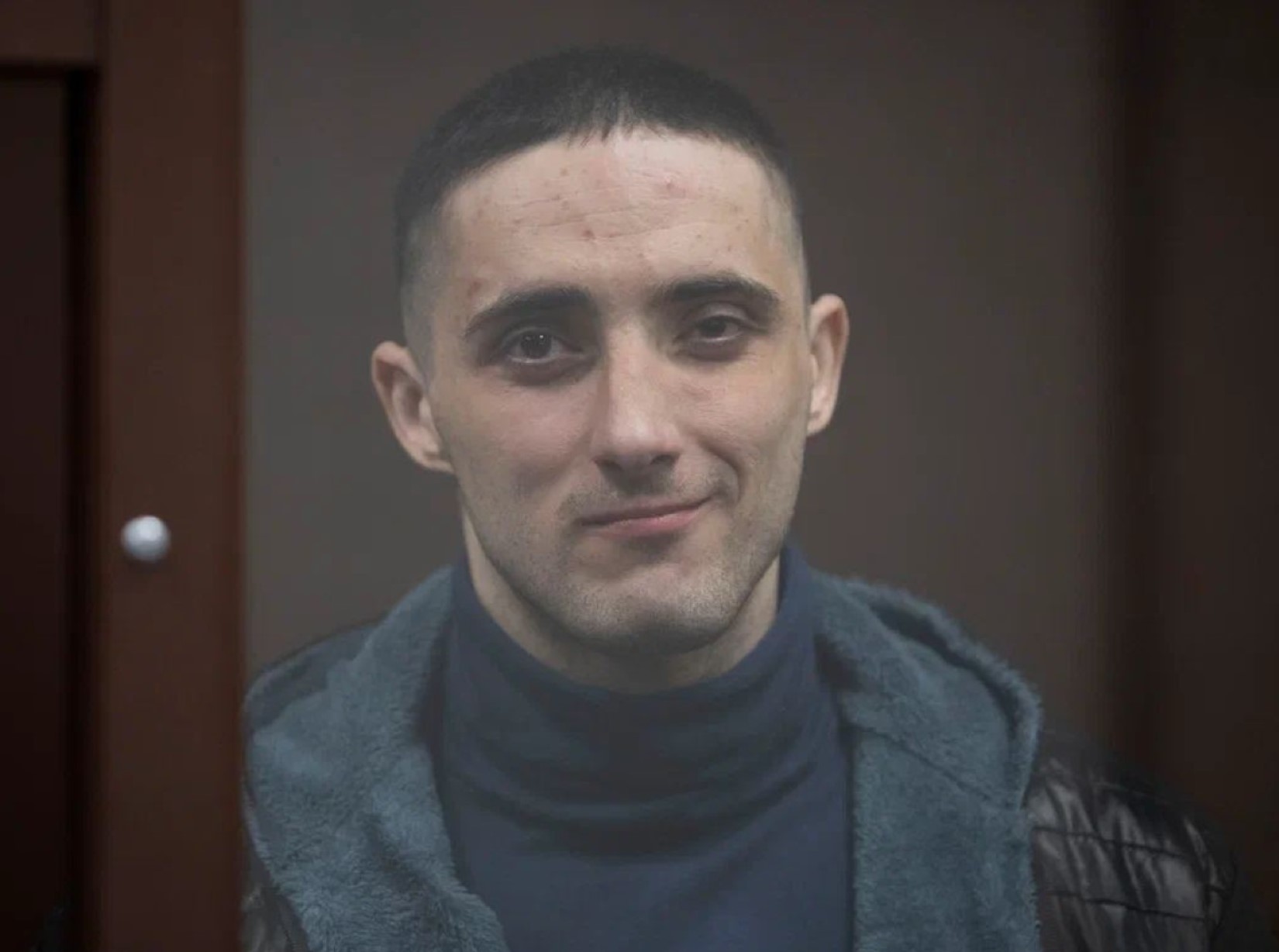
Russia’s notorious Southern District Military Court has sentenced Dmytro Yevhan, a 26-year-old marine and prisoner of war [POW] to 20 years harsh-regime imprisonment. The young Ukrainian has, in direct violation of international law, been ‘tried’ and imprisoned by the aggressor state for defending his country.
Russia has been using its military court in Rostov for politically motivated ‘trials’ of Crimean Tatar and other Ukrainian political prisoners since 2014, and this is by no means the first shocking sentence against Ukrainian citizens passed by presiding ‘judge’ Roman Viktorovich Saprunov. Nor is this the first ‘trial’ and illegal sentence of a Ukrainian defender, however Russia stages most of these judicial travesties on occupied territory (in its proxy ‘Luhansk and Donetsk people’s republics’) where nothing is typically even known of such ‘trials’ until Russia’s prosecutor general or ‘Investigate Committee’ report, post-fact, the ‘convictions’ and sentences.
Yevhan is a senior marine in Ukraine’s 36th Marine Brigade which took part, together with the Azov Regiment, in the defence of Mariupol in 2022. The Russian prosecution claimed that, in April 2022, Yevhen dealt at least nine knife wounds to Viktor Lupatsiya, a fighter from the Russian proxy ‘Donetsk people’s republic’ who was, purportedly, in captivity, and therefore a prisoner of war.
Essentially the same charges were laid as in the vast majority of Russia’s fake ‘trials’ of Ukrainian prisoners of war in occupied Donetsk and Luhansk oblasts. A Ukrainian marine, defending his own country, was charged by the invading state, under the latter’s criminal code, with ‘attempting a violent seizure of power’ (Article 278) and of ‘training in terrorist activities’ (Article 205 § 3) The other two charges were of ‘attempted murder with particular brutality’ (Article 105 § 2) and of cruel treatment of prisoners of war (Article 356 § 1).
In reporting the trial, MediaZona stated that Yevhan had fully admitted the attack on Lupatsiya, “repented and apologised” to him. He told the court that, at the time of the attack, he had been under the effect of strong painkillers after the amputation of his right hand on 19 March, without access to proper medical care.
This admission should perhaps be viewed in the context of Yevhan’s retraction of other ‘testimony’ which he told the court had been obtained through torture. Even if there had been an attack on Lupatsiya, in conditions of war this would only count as a crime if the fighter had surrendered and had been unarmed. In previous ‘trials’, Russia has used occupation ‘courts’ to charge Ukrainian defenders with the kinds of war crimes (attacks on civilians, on POWs, etc) that Russia is known to have been committing.
In court, Yevhan retracted, as given under torture, his ‘confession’ to cruel treatment of prisoners of war; ‘attempting a violent seizure of power’ and ‘training of terrorist activities’ Russia had claimed that the latter two charges were ‘proven’ by the fact that Yevhan had undergone training at Ukrainian Armed Forces’ military sites.
In his final address, Yevhan told the court: “I am an acting serviceman of Ukraine’s army and gave an oath to my people. I had to defend my country, and I am no terrorist”.
Yevhan was represented by Maria Eismont, a Russian lawyer who has defended many of Russia’s Ukrainian political prisoners. She pointed out, during the final court debate, that Lupatsiya had not lodged a civil suit for ‘compensation’ against Yevhan, and stated in court, that he did not bear a grudge against him.
The Russian prosecutor had demanded a 24-year sentence, Supranov and two other judges handed down a 20-year sentence, with the first five years in a prison, the worst of Russia’s penal institutions.
While releasing convicted murders, rapists and violent criminals in exchange for killing Ukrainians, Russia has thus far staged such ‘trials’ of around 300 Ukrainian prisoners of war, with sentences of up to life imprisonment handed down without any real evidence. In the majority of cases, the Russian prosecutor or Investigative Committee post videoed ‘confessions’ almost certainly obtained through torture, together with information about the charges and sentence.
On 6 March, a ‘court’ in occupied Donetsk sentenced Oleksandr Pecharsky and Serhiy Heorhiyu to life imprisonment. It was claimed that they had opened fire at civilians in occupied Mariupol and killed five civilians and injured two others. Such charges are rendered all the more unconvincing by the fact that the alleged ‘opening fire at civilians’ is supposed to have taken place “from March to April 2022”.
See also:
Huge mass ‘sentences’ after fake trial of Ukrainian POWs whom Russia accused of its own war crimes
Russia’s killings of Ukrainian prisoners of war are likely state-approved war crimes
